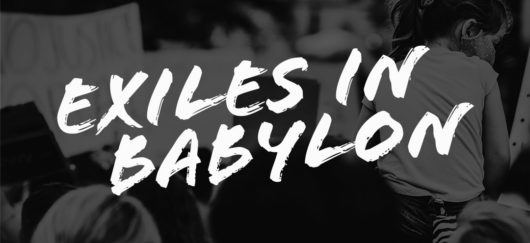While many conservative evangelicals focus on fighting culture wars in an attempt to save the United States from progressive ideologies, New York Times bestselling author Preston Sprinkle seems to have accepted that Christians should reimagine their identity as exiles rather than as culture warriors.
As host of the popular Theology in the Raw podcast, Sprinkle created the Exiles in Babylon conference, which held its first meeting March 31 through April 2 in Boise, Idaho, and was available for streaming online. According to the event website, “The Bible has a name for the country we’ve been exiled to: Babylon. As exiles living in Babylon, we need to think biblically, Christianly, indeed exilically — not partisanly — through cultural and political issues.”
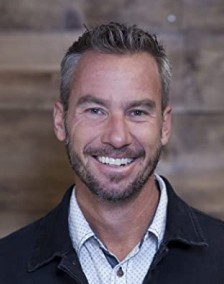
Preston Sprinkle
Sprinkle’s desire to think “exilically” rather than “partisanly” means he can be rather difficult to box into stereotypical dichotomies for many people. On one hand, he is a pacifist who opposes war and the death penalty, speaks out against gun violence, promotes social justice and even rejects the idea of hell as eternal conscious torment. But on the other hand, he remains unaffirming of LGBTQ people and believes in the absolute authority of the Bible.
The Exiles in Babylon conference reflected Sprinkle’s desire for diversity within the parameters he believes are compatible with biblical Christianity. Speakers included a variety of theological perspectives, races, genders and even included LGBTQ people who are not affirming of same-sex relationships.
The conference was organized into four main sessions that focused on unity and exile, sexuality and gender, racism and Critical Race Theory, and the nature of hell.
As the conference unfolded, it became clear there was much to affirm regarding organizers’ ultimate desire for unity and wholeness, but that there also is a disconnect between how they address sexuality and how they address race. As a result, I walked away from the conference having learned so much, while also wondering why its good news wasn’t quite good enough.
“I walked away from the conference having learned so much, while also wondering why its good news wasn’t quite good enough.”
A meta-narrative of unity, the fall and human desire
During his sermon about how the American church created and profited from racism, Thabiti Anyabwile said, “If you don’t know the story you are living in, you can’t understand the story that you’re living out … . The meta-narrative shapes the mini-narrative of our personal stories and biographies.”
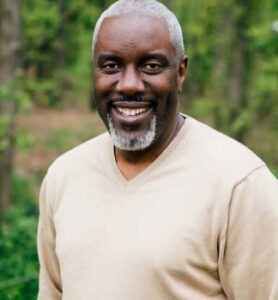
Thabiti Anyabwile
Anyabwile is pastor of Anacostia River Church in Washington, D.C., and a popular author.
The meta-narrative of the Exiles in Babylon conference began with human dignity based on the unity and wholeness described in Genesis 1-2 and reflected at the Lord’s Table.
Sprinkle said even to those present who might disagree with him: “You are welcome here because you bear the imago dei, the image of God. He delights in you. And God’s favor is on all of you.”
Francis Chan, also a popular Christian author, preached about the God “who just spoke and said, ‘Earth,’ and the entire earth appears.” He said we’re missing “that deepness, that oneness, that true connection that we were created for.”
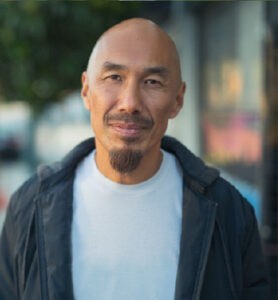
Francis Chan
In a sermon that carried many Catholic connotations, Chan spoke of the uniting of heaven and earth, the divine and the human in the womb of the Virgin Mary. Imagining that a woman in the audience was the Virgin Mary, Chan said, “How would you treat her? … How much honor would you show her? … I am not going to mess with her … Do you believe the Holy Spirit of God is inside of me? … Do I believe that about you? That God is inside of you? Then how would I treat you? … We should treat everyone who has the Spirit of God in them like we would treat the Virgin Mary. To say to a son of God, ‘You’re not welcome at our table,’ … what does God think when you refuse to invite certain ones of his children?”
This emphasis on human dignity was a much-welcomed nuance from the emphasis on human depravity that so deeply shapes many other conservative evangelical conferences today.
Still, the problem of sin and exile has to be dealt with. According to Eli Bonilla, Masters Fellow with OneHope: “The exile started in Eden, where Adam and Eve fell and were exiled away from the garden.”
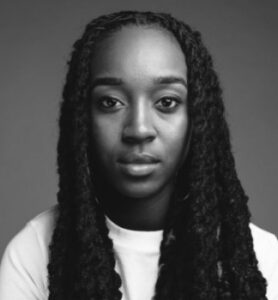
Jackie Hill Perry
Christian author Jackie Hill Perry added, “Because we’re born after Adam, I believe that orientates us toward sinfulness.”
So the big story, according to this conference, was that humans were created unified and whole but then fell into separation and brokenness due to the sin of Adam.
Just as their understanding of the human story is one of unity from which we fell, Chan also mapped that narrative onto church history, claiming: “For the first 1,500 years after Christ … the body and blood were always central … Jesus was at the center … . It was one church for a thousand years. And then it was two or three for the next 500. And then it split into this? Why can’t we go back? … There was a time when the church was one. A long time. A thousand years.”
According to this story, while we are fallen and separated, we all desire to be reconciled to unity and wholeness again. Chan said: “There’s a younger generation that wishes there were no labels. They don’t want to be called Presbyterians or Baptist or Roman Catholics or Eastern Orthodox. They don’t want to be called evangelical or Protestant … . They want this oneness that Christ prayed for.”
A mini-narrative of broken sexuality and gender
The most heart-breaking session of the conference for me by far was hearing the stories of the LGBTQ speakers.
Jackie Hill Perry set sexuality within the meta-narrative of Genesis 1 and 2, saying, “Humans did not create marriage, nor was marriage created after the fall. God did the thing in Genesis 1 and 2 and this thing points to the gospel, which makes marriage a very important metaphor that you don’t want to mess up.”
Sprinkle also echoed that meta-narrative, saying it’s “woven into the fabric of the very fundamental creation account” and that “you have humanity in his image as male and female, woven into the fabric of the creation account.”
But then, according to their meta-narrative, the fall reshaped human desires. “If you were a boy that liked a girl, depending on what kind of parents you had, if they weren’t in the SBC they might have thought it was cute,” Perry said. “If you were a girl that liked a boy, they might’ve thought it was terrifying. And if you were a girl or a boy that liked the same gender, they most likely didn’t even know.”
Despite her certainty about the Bible’s authority and teaching on sexuality, Perry said, “There are times when what you know still doesn’t quench how you feel.”
But Perry seemed to care very little about how LGBTQ people feel. Instead, she said: “The mission statement of the culture is do what thou wilt. … There is wrath among humans for anyone that would dare say that God is Lord of the body. … It’s a hard word to tell someone they can’t do what they want. … We’re moving toward a time in history where it will be increasingly hard to commit yourself to a certain sexual ethic. … Fear him who can throw both body and soul into hell.”
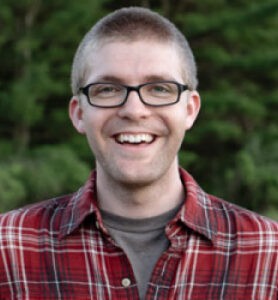
Greg Coles
Greg Coles, author of the book Single, Gay, Christian, joked about studying Greek words to learn about his sexuality: “If you want to get all geeky about the Greek with me in the hallway later, we can talk about the dubious origins of the word ‘arsenokoites.’” After much Bible study, he realized: “There was no biblical guarantee that I would be straight … . There was still a best way of understanding the text … that I was called to a life of singleness and celibacy.”

Kyla Gillespie
Kyla Gillespie, who is a rare example of someone who changed genders and then changed back, shared about how she felt attracted to her friends but was in love with Jesus. She spoke of her gender dysphoria, and how she transitioned and then de-transitioned. “Let’s put the authority of the Bible over our relationships,” she said. “Not your opinion. God’s opinion. Not your feelings. God’s design. God’s purpose. God’s Bible.”
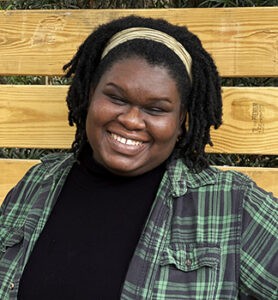
Johana-Marie Williams
Author and historian Johana-Marie Williams also talked about how she overcomes her bisexual desires through Bible studies about God’s love and an orthodox sexual ethic.
For Tony Scarcello, host of the “Regenerate” podcast, the darkness almost became too much. He spoke of trying to prove his heterosexuality growing up but feeling “a sickness, a monster that was looming inside of me and ready to break out and attack at any moment.” He confessed, “I got to the point where I genuinely believed that my parents, my church, my God would rather see me dead than see me be somebody who lives this stuff out, who lives out these desires. And I would rather be dead than be somebody who lives with all this tornado stuff happening inside my soul.”
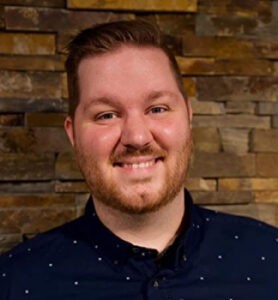
Tony Scarello
After sneaking his parent’s gun out of their bedroom one night, Scarcello said, “I genuinely believed that them being woken up by that shot would be more of a relief to them than if they actually knew what was happening inside of me.”
Scarcello said the solution for him came “not by changing your sexuality, not by changing 2,000 years of church history on marriage, but by redeeming and renovating your heart.”
When asked about sexual orientation, Perry said, “If we want to talk about any orientation, I think it would be the orientation toward wickedness.”
When asked about attending the weddings of gay friends or family, Sprinkle said, “Attending is a gray area … . What would your attendance signify?”
When asked about how adults should respond if a transgender pre-teen asks them to use certain pronouns, Sprinkle said, “I think there is a healthy way, in love and understanding and humility to maybe say, ‘No. I’m not going to use your pronouns.’ But again, that needs to be in the context of a really healthy, robust relationship. And even then, I’m going to say case by case.”
When asked about Matthew Vines, a prominent gay Christian and author of the book God and the Gay Christian, Coles said, “Even though I think there’s a better way of reading the text than he has read it, I want to affirm the fact that he is deeply committed to trying to understand the text and recognize its authority in all our lives.”
But Sprinkle said he was uninterested in ever having Matthew Vines on his podcast, explaining: “The affirming/non-affirming argument is about the biblical text … . I’ve spent literally hundreds and hundreds of hours reading and thinking through the affirming argument. … I find it so utterly un-compelling and almost manipulative of the biblical text because their arguments can sometimes feel compelling but sometimes they’re just flat out false. … I feel like it would immediately turn into kind of an argument. … I don’t think it would be fun for me. I don’t find the biblical arguments interesting to me anymore.”
A mini-narrative of racial awareness and justice
The most powerful and informative session by far was the session on race.
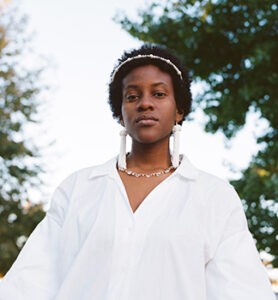
Kimi Katiki
Kimi Katiti, an interdisciplinary YouTube artist, spoke of the need for forgiveness and healing, how both can be found in Jesus, and how we need to be willing to die like a seed for fruit to be born.

Derwin Gray
Derwin Gray, founding pastor of Transformation Church near Charlotte, N.C., spoke movingly about the dignity of all humans, saying: “If one part of the body suffers, then we all suffer. We’ve got to really actually start to see each other as family. … As a human being, as a follower of Jesus, your pain is my pain. … You are a gift to me. What is it about you that can make me more human?”
Regarding racial diversity, Gray said, “When you come together, the other brings out more flavor in you. … Our ethnic distinctions are not obliterated. They are celebrated.”
“In every ethnicity and in every culture the image of God is located,” Gray said. “And when we say we’re color blind, we are muting the creative genius of God. And when you and I mute the creative genius of God, we are muting our humanity in Christ. And we’re devaluing our brothers and sisters who are not a part of the majority culture.”
When asked about reparations, Anyabwile said: “Part of what needs to be restored is dignity. We had a system of theft that not only took labor, but took culture, took dignity, to some extent took a sense of humanity. … We’ve got to actually have conversations about ending the indignities of a society that was predicated upon that kind of theft and restoring dignity to those for whom it has been robbed.”
With the clarity of a prophet, Anyabwile preached: “Race and racism is not something that happened to the American church, but something the American church did using the Bible to create, legalize and profit from … . Race and racism are topics Christians ought to know the truth about, ought to know a great deal about. After all, it is the American church’s creation.”
Instead, Anyabwile said: “Willful ignorance is a significant part of white American culture.”
The disconnection between sexuality and race
The difference between how sexuality and race were handled at Exiles in Babylon could not have been more striking.
While the conversation about race acknowledged how the suffering of one affects us all, speakers never mentioned how the suffering of LGBTQ people affects the entire body of Christ.
While the conversation about racial diversity mentioned bringing out flavor, the posture toward sexual diversity was dismissive of feelings and flavor.
While a wide range of racial diversity was celebrated, sexual diversity was obliterated down to two possibilities — complete abstinence and celibacy or heterosexual, monogamous marriage.
While the exploration of race celebrated the creative genius of God, declarations on sexuality muted the creative genius of God by pressuring LGBTQ people to mute their humanity by pretending to be non-sexual beings, thus devaluing them as those who are not a part of the majority sexual orientation.
While speakers discussed in detail how Critical Race Theory leads us to ask specific questions about how society has been built to fuel oppression of racial minorities, they failed to bring that same level of structural examination for why the church made its own LGBTQ teachers feel so disembodied and suicidal.
“Given that he doesn’t find the biblical arguments about sexuality interesting anymore, is he no longer willing to have his own presuppositions about the Bible challenged?”
Sprinkle said in his introductory remarks that he wanted the conference “to challenge your presuppositions.” But given that he doesn’t find the biblical arguments about sexuality interesting anymore, is he no longer willing to have his own presuppositions about the Bible challenged?
What is the Bible?
Because Exiles in Babylon is asking LGBTQ people to mute their humanity by denying their sexuality based on the Bible, it’s important to consider what the Bible is and if it functions in the way they assume.
Sprinkle said: “If the Creator who breathed stars into existence, and if that Creator breathed out his word, and if in that word he says this is what justice looks like, and I’m the created person, not the creator, then I don’t have any logical right to say, ‘No, that is not right.’”
This would seem to indicate that Sprinkle believes the Bible is God’s direct words to humans about marriage and sexual relationships.
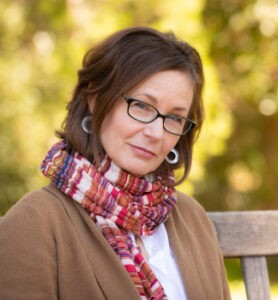
Sandy Richter
But during her presentation, Hebrew Bible scholar Sandra Richter seemed to have a somewhat more nuanced understanding of marriage and the Bible. While dealing with a few problematic texts in Deuteronomy, Richter said: “Marriage in the ancient world is very different from marriage in our world. Marriage was not the individual choice of two adults of legal age based on chemistry and compatibility. Marriage was an alliance between two families designed to distribute wealth in a mutually beneficial fashion. Even when chemistry was in the mix … economic advantage was still the controlling objective.”
Richter acknowledged: “The Bible portrays little if any awareness for individual human rights.” She also admitted, “We find this foreign at best, offensive at worst.”
For Richter, studying and applying the Bible is a “cross-cultural experiment (that) demands that we attend to the legal concepts and principles operating in their society.”
Regarding the Genesis 1-2 story that Sprinkle and others had been basing universal laws about marriage and sexuality on for all time, Richter said the image of God is “an animated incarnation of the deity.” She said Yahweh in this story is “mimicking a Babylonian and Egyptian animation ritual by which the pagans, the polytheists, animated their idols, made them ‘living gods.’ And that’s what Yahweh is doing as he crafts us from the dirt, breathes breath into our nostrils, and then installs us in the temple. … The Babylonian ritual follows that same process where a crafted statue goes from being a statue to being an animate deity. And so what Yahweh is saying to us and to Israel is, ‘You don’t get to make idols. You don’t get to make images of me because I’ve already made an image of me. And it’s you.”
What is clear from Richter’s scholarship is that the Bible’s conversation about the image of God and marriage is foreign to what conservative evangelicals assume about the image of God and marriage. Even if we are to assume that God directed the words of the biblical authors, we would have to admit that God was meeting them within the culturally situated cosmological, relational and political assumptions of their day and evolving them closer to a future ideal of love, rather than wanting to keep humanity trapped in ancient culture.
During the race discussion, Gray said the “God said it, I believe it, that settles it” assumption people have is “epistemologically naive and a little condescending.” Yet when it comes to the sexuality discussion, that’s exactly the level of certainty the non-affirming speakers at Exiles in Babylon had.
To be clear, I am not saying the Bible is affirming of LGBTQ relationships. I’m simply saying the Bible was having a fundamentally different conversation than we’re having when we talk about marriage and sexuality today. And because of that, I don’t see how we can so confidently mute the humanity of LGBTQ people by cutting them off from their sexuality with the threat of hell.
Final justice, human desire and a good-enough news
The final session of the conference was a debate between a defender of hell as eternal conscious torment and a defender of hell as annihilationism. Unfortunately, while they mentioned that some Christians believe in universalism, there were no universalists present to share their case.
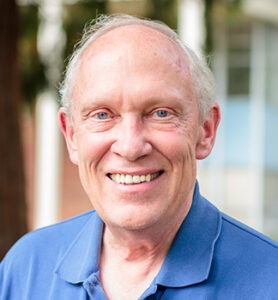
Gerry Breshears
Ironically, Gerry Breshears — professor of theology at Western Seminary and the defender of eternal conscious torment — admitted, “Which of these views feels like the best view of God as I see him? And the answer for me is universalism. This is the only one that would even begin to satisfy me … But see, the problem is I don’t get to do that. … This repeats the Edenic sin of defining from my own perspective what is good, right, true, beautiful and real.”
And here we have yet another assumption based on the meta-narrative of a unified Eden from which we fell.
But during the conversation about race, the artist Street Hymns made a very subtle, yet fundamentally relevant statement: “I want to be your friend. I do not want racial reconciliation ’cause that means I have to go back. I don’t want racial reconciliation. I don’t even know what that is.”

Street Hymns
In contrast to Chan’s question of “why can’t we go back” to an idealized past, Street Hymns understands the true meta-narrative of the real world we live in as humans or as Americans is not a narrative of falling from some prior state of unity. He understands the true meta-narrative is that we are a community in becoming.
Anyabwile said: “The story of progress isn’t linear. And it feels to me, if I read the history correctly, almost always fragile.” He added: “This room really isn’t possible 60 years ago … . That’s huge progress in one sense. In another sense, the story of progress is way more complex. There’s still many other things that are not only not moving forward, but in some cases moving backward.”
What could we be moving forward toward?
In his book Tradition and Apocalypse: An Essay on the Future of Christian Belief, David Bentley Hart says, “Faith is the will to let the past be reborn in the present as more than what until now had been known, and the will to let the present be shaped by a future yet to be revealed. Hope is the conviction that the revelation will not only fulfill but far exceed the promise that the tradition preserves within itself. And, in the end, faith and hope will both pass away, or rather pass over into perfect love — which is, at the last, another name, and perhaps the highest, for that final horizon that calls all thought and all of creation to itself.”
The most effective missional community ever
The conference ended with a sermon by Jon Tyson, lead pastor of Church of the City of New York, who said: “I know of no other community that’s modeled (functional unity better) than Zinzendorf and the Moravians.” Nikolaus von Zinzendorf was a German religious and social reformer, bishop of the Moravian Church and a major figure of 18th century Protestantism.

Jon Tyson
Tyson explained how the Moravians’ Communion gathering had such a uniting of heaven and earth that “they said they could not tell for a period of 11 or 12 hours whether they were on earth or in heaven.” He added that Richard Lovelace claimed they were “the most effective missional community in all of recorded church history up until that time,” inspiring the likes of the Wesleys, George Whitfield and William Carey.
Ironically, the meta-narrative of Zinzendorf was universalism. In Sixteen Discourses on the Redemption of Man by the Death of Christ, Zinzendorf said, “He must first manifest himself as Jesus everywhere, then the soul will also experience him as Christ … . By this his name all can and shall obtain life and salvation.”
Exiles in Babylon has a lot of potential for being a catalyst for deep healing in our culture today given its embrace of oneness and human dignity. But it needs to tap into its desire for unity and oneness, while expanding its willingness to include LGBTQ affirming and universalist voices alongside its voices about race. If they can become willing to challenge their own presuppositions about the Bible, then perhaps they’ll be able to fulfill Sprinkle’s desire to help people “think more deeply and love more widely.”
This article was made possible by gifts to the Mark Wingfield Fund for Interpretive Journalism.
Rick Pidcock is a 2004 graduate of Bob Jones University, with a bachelor of arts degree in Bible. He’s a freelance writer based in South Carolina and a former Clemons Fellow with BNG. He recently completed a master of arts degree in worship from Northern Seminary. He is a stay-at-home father of five children and produces music under the artist name Provoke Wonder. Follow his blog at www.rickpidcock.com.
Related articles:
What do you say when a mom wishes her child were dead instead of gay? | Opinion by Bridget Eileen Rivera
God says it: You are good enough | Opinion by Amber Cantorna

